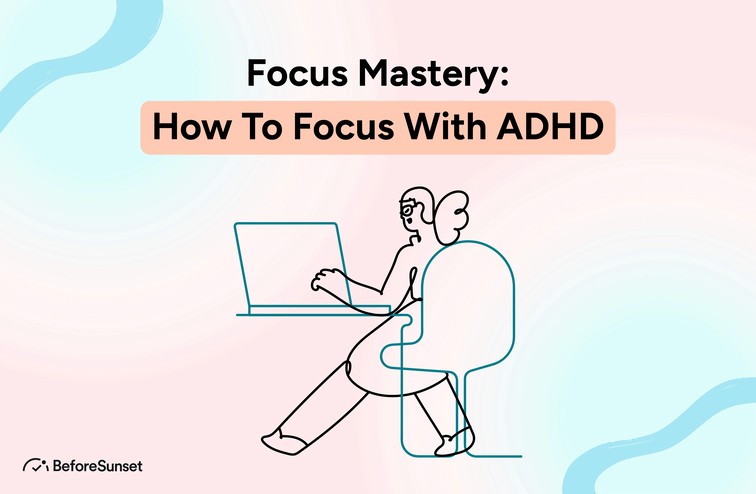This blog serves as your guide through the complexities of ADHD, providing you with useful tips, techniques, and professional guidance to help you improve your concentration and regain control over your attention.
Whether you're a professional navigating a tough work environment, a student aiming for academic achievement, or an individual just trying to maximize everyday chores, this guide is designed to offer practical advice for improving your concentration and mastering your attention.
Come along as we investigate the relationship between psychology, neurology, and personal empowerment, revealing a route to Focus Mastery that fits your own goals and talents.

Understanding ADHD in the Brain
Recognizing the neurological foundations that support Attention Deficit Hyperactivity Disorder (ADHD) is essential to understanding the condition.
Although the exact origins of ADHD remain mostly unknown, research suggests that the disorder is linked to distinct patterns of brain activity as well as anatomical variations. Among the crucial elements are:
Neurotransmitter Imbalance: ADHD is often linked to imbalances in neurotransmitters, particularly dopamine and norepinephrine. These chemicals play crucial roles in regulating attention, impulse control, and executive functions.
Frontal Lobe Dysfunction: The frontal lobes, responsible for executive functions such as planning, organization, and impulse control, show differences in activity and structure in individuals with ADHD. This dysfunction can contribute to difficulties in attention regulation and behavioral control.
Delayed Brain Maturation: Studies suggest that individuals with ADHD may experience a delay in the maturation of certain brain structures, particularly the prefrontal cortex. This delay could affect the development of crucial cognitive functions.
Cortical Thinning: Research indicates that there may be differences in cortical thickness in certain regions of the brain in individuals with ADHD. This thinning could impact the brain's ability to effectively process information.
Reward System Abnormalities: The brain's reward system, involving the release of dopamine, may function differently in individuals with ADHD. This can influence motivation, reinforcement, and the ability to focus on tasks.
Impaired Connectivity: Studies using neuroimaging techniques have revealed altered patterns of connectivity between different brain regions in individuals with ADHD. These connectivity issues may contribute to difficulties in integrating information and coordinating cognitive processes.
Tips for Focusing with ADHD
Managing distractions, impulsivity, and trouble maintaining focus are common aspects of living with ADHD; success in this path requires specialized solutions. This collection of insights delves into useful strategies and tactics to improve concentration, increase output, and foster a more methodical and disciplined approach to daily chores.
Single Tasks and Daily To-Do Lists
In an era of digital technology where multitasking is the norm, single-tasking becomes apparent as a paradoxical yet effective strategy. We explore the science of single-tasking and how it corresponds with the brain's ability to focus intently and function at a higher level.
Discover useful strategies for adopting single-tasking into your daily routine to overcome the pattern of continuously switching between tasks and to realize your full potential for increased productivity and focus.
Everyday to-do lists are a physical guide to overcoming obstacles and seizing the chances of the day. The art of creating to-do lists that work is examined in this part, with a focus on goal-setting that is practical, prioritized, and clear.
Find out how a well-managed daily to-do list may act as a driving force by giving you direction and a sense of success. We also explore several approaches to organizing to-do lists according to individual interests and styles.
As we examine the ways in which single-tasking and daily to-do lists may enhance one another, it becomes clear how these two tactics might work in concert.
Learn how to leverage the structure and direction that a well-crafted to-do list provides to include concentrated, single-task sessions in your day. This section provides helpful advice on finding a balance that maximizes output while avoiding the dangers of overcommitment.

Finishing Tasks Before Taking a Break
We explore the Zeigarnik Effect and its psychological foundations for the "finish before break" approach. According to this psychological phenomenon, people tend to remember interrupted or incomplete tasks more vividly than ones that are finished.
People can take advantage of this impact to increase motivation and lessen the mental load that comes with unfinished business by finishing chores before taking a break.
Examine how setting a goal to finish a task before a break encourages commitment and a sense of urgency. People who refrain from multitasking and focus on one thing at a time can become more productive and have a more seamless workflow.
Find out how this tactic reduces interruptions and distractions, fostering a more productive workplace.
One of the main components of the "finish before break" strategy is efficient time management. We go over useful advice on how to use time-blocking strategies, divide more complex activities into smaller, more manageable chunks, and set realistic targets.
Learn how these tactics help create a more orderly and controlled workflow that makes it easier to accomplish assignments.
Physical Activity, White Noise, and Noise-Canceling Headphones
In addition to being good for general health, physical activity is essential for improving concentration and cognitive function. We explore the science underlying how physical activity activates the brain, leading to enhanced focus, elevated mood, and increased attentiveness.
Learn useful strategies for introducing brief physical exercise intervals into your daily schedule to clear your head and increase productivity.
White noise has been shown to have a calming impact on the brain since it is a continuous sound that includes all frequencies that are detectable to the human ear. We investigate how white noise can create an audio cocoon of stability that is beneficial to focus by muffling disturbing background noise.
For improved attention, find out more about the many sources of white noise and how to smoothly incorporate them into your workspace.
Headphones with noise cancellation prove to be a useful tool in the pursuit of a distraction-free work environment. We examine the technology underlying noise cancellation and how well it reduces outside disruptions.
Learn about the many situations—from remote work arrangements to open-office environments—where noise-canceling headphones may be very useful. There are also helpful hints for choosing the ideal combination and maximizing their use to promote optimal focus.
Abundance of Attention to Boring Tasks
We start by looking at the contradictory nature of focusing too much attention on uninteresting things. Examining the causes of the increased concentration on these activities, we investigate how the brain's default mode may lead to an excessive emphasis on repetitive tasks and strategies for productively redirecting this attention.
Learn practical techniques for keeping interest and concentration in check when working on tedious activities. We examine methods that minimize mental weariness and improve overall productivity, such as using the Pomodoro Technique and taking thoughtful breaks. These strategies try to find a middle ground between focusing on the current work and adding rest periods.
Maintaining interest in and concentration on tasks that may be viewed as tedious is mostly dependent on the intrinsic drive. We explore strategies for developing intrinsic motivation, including goal-setting, discovering purpose in one's work, and appreciating the long-term advantages of finishing seemingly uninteresting activities.
Tasks that are repetitive provide a special chance to foster creativity and ingenuity. We investigate how to infuse creative elements into everyday tasks, creating a feeling of achievement and adding enjoyment to the process. This section aims to inspire creative problem-solving and novel approaches to tasks that may appear ordinary.

Professional Mental Health Support for ADHD Focus Challenges
1. Comprehensive Assessment:
Mental health professionals, including psychologists and psychiatrists, conduct a thorough assessment to diagnose ADHD and understand the individual's specific challenges with focus.
2. Individualized Treatment Plans:
Professionals create personalized treatment plans that address the unique needs and circumstances of individuals with ADHD, taking into account factors such as co-occurring conditions, lifestyle, and personal preferences.
3. Cognitive-Behavioral Therapy (CBT):
CBT is a widely used therapeutic approach for managing ADHD-related focus challenges. It helps individuals develop practical strategies to overcome distractions, improve organizational skills, and enhance overall attention.
4. Medication Management:
Psychiatrists play a key role in prescribing and managing medications for ADHD. They assess the appropriateness of medications, adjust dosages, and monitor their effectiveness in improving focus and attention.
5. Executive Function Coaching:
Executive function coaches specialize in supporting individuals with ADHD in areas such as planning, organization, time management, and task initiation. They provide practical strategies to enhance daily functioning and improve focus.
6. Holistic Wellness Approaches:
Mental health professionals may integrate holistic approaches into treatment plans, including mindfulness techniques, stress reduction strategies, and lifestyle modifications. These elements contribute to overall mental well-being and can positively impact focus.
7. Goal Setting and Skill Development:
Therapy sessions often involve setting specific goals related to improving focus and attention. Mental health professionals work with individuals to develop skills and strategies that align with these goals.
8. Behavioral Interventions:
Behavioral interventions, such as reinforcement techniques and reward systems, are employed to encourage positive behaviors related to focus and attention. These interventions are often tailored to the individual's needs and preferences.
How Can BeforeSunset AI Help You?
At BeforeSunset AI, we understand the struggles of ADHD and feel that everyone deserves a chance to succeed. That is why we've created our innovative productivity solution to help maximize productivity and give everyone a chance to succeed.
By taking the time to understand and research more about ADHD strategies through our blog, you can take the next steps toward a successful future. We believe in you and are here to help. Let's start this journey together.


